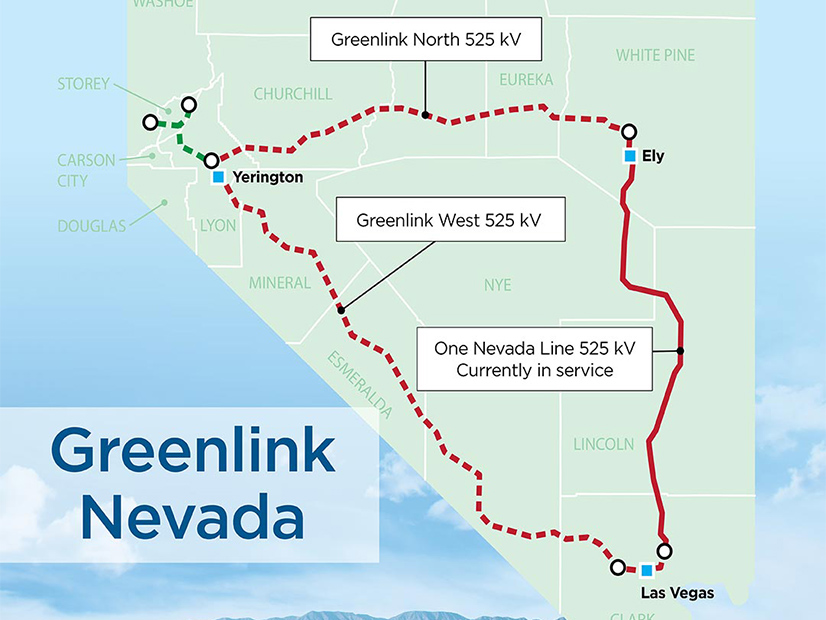
Nevada regulators have approved NV Energy’s $901 million Greenlink North project, a 235-mile power line across northern Nevada that will complete a transmission triangle around the state.
Greenlink North is one piece of NV Energy’s Transmission Infrastructure for a Clean Energy Economy Plan, which was included in Phase IV of the utility’s triennial integrated resource plan (IRP) for 2022 to 2041. The Public Utilities Commission of Nevada (PUCN) voted 3-0 on Jan. 24 to approve Phase IV of the IRP.
Greenlink North will run from Robinson Summit, near Ely in eastern Nevada, to Fort Churchill near Yerington.
The 525-kV transmission line will connect NV Energy’s existing One Nevada line along the east side of the state to Greenlink West, a yet-to-be-built line that will run down the west side of the state. Greenlink West and One Nevada will meet in the Las Vegas region.
PUCN approved Greenlink West in March 2021 and the project is scheduled for completion in December 2026. (See Regulators Greenlight NV Energy’s Greenlink West.) NV Energy expects to complete Greenlink North by December 2028.
An NV Energy spokesperson said engineering and permitting work are now underway for both Greenlink West and Greenlink North.
The Bureau of Land Management’s Nevada State Office will lead the National Environmental Policy Act environmental review process for the projects, the spokesperson said. The BLM plans to issue a notice of intent in April to start the process.
Legislative Requirement
NV Energy was required to file a Transmission Infrastructure for a Clean Energy Economy Plan (TICEEP) as part of Senate Bill 448, a wide-ranging energy bill approved during the 2021 state legislative session.
NV Energy filed an application for TICEEP on Sept. 1, as an amendment to its IRP application filed in June.
In addition to Greenlink North, TICEEP includes a 32-mile, 525-kV line just north of Las Vegas.
The $143 million project will run from the Harry Allen substation to the Northwest substation.
One goal of TICEEP is to expand transmission access to renewable energy zones and promote development of renewable energy resources in the state.
The plan is also intended to assure a reliable and resilient transmission network in the state and support the development of regional transmission interconnections.
In its application for the plan, NV Energy said an interconnected Western grid would give the state access to a wider variety of renewable energy resources. While Nevada’s location gives it a chance to be a key player in that grid, the state has thus far lacked transmission infrastructure, the utility said.
The new infrastructure included in TICEEP “continues to build a foundation for the state to access diverse renewable energy resources for use within Nevada while increasing the transfer of energy between Nevada and the developing western grid.”
Solar Projects Approved
The approval of Greenlink North comes after PUCN recently approved another part of NV Energy’s IRP, which includes two new solar-plus-storage projects in Humboldt County.
The Iron Point solar project will combine a 250-MW solar photovoltaic system and 200 MW of battery storage. The Hot Pot solar project will include a 350-MW solar system and 280 MW of battery storage.
Both projects are being developed and built by Primergy Solar. NV Energy expects Iron Point to be in service in December 2023, with Hot Pot in service a year later.
The projects will replace NV Energy’s only remaining coal fired power plant, the North Valmy Generating Station, the utility said in a release.
NV Energy said the two new solar projects will join its renewable portfolio of 55 geothermal, solar, solar plus storage, hydro, wind, biomass and supported rooftop solar projects either in service or under development.



